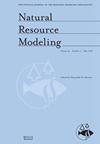Time delays and pollution in an open‐access fishery
IF 2.1
4区 环境科学与生态学
Q3 ENVIRONMENTAL SCIENCES
引用次数: 0
Abstract
We analyze the impacts of pollution on fishery sector using a dynamical system approach. The proposed model presupposes that the economic development causes emissions that either remediate or accumulate in the oceans. The model possesses a block structure where the solutions of the rate equations for the pollutant and the economic activity act as an input for the biomass and effort equation. We also account for distributed delay effects in both the pollution level and the economic activity level in our modeling framework. The weight functions in the delay terms are expressed in terms of exponentially decaying functions, which in turn enable us to convert the modeling framework to a higher‐order autonomous dynamical system by means of a linear chain trick. When both the typical delay time for the economic activity and the typical delay time for the pollution level are much smaller than the biomass time scale, the governing system is analyzed by means of the theory for singularly perturbed dynamical systems. Contrary to what is found for population dynamical systems with absolute delays, we readily find that the impact of the distributed time lags is negligible in the long‐run dynamics in this time‐scale separation regime.开放渔业中的时间延迟和污染
本文采用动力系统方法分析了污染对渔业部门的影响。所提出的模型假设经济发展导致排放,这些排放要么修复海洋,要么积聚在海洋中。该模型具有块结构,其中污染物和经济活动的速率方程的解作为生物量和努力方程的输入。在我们的建模框架中,我们还考虑了污染水平和经济活动水平的分布式延迟效应。延迟项中的权重函数用指数衰减函数表示,这反过来使我们能够通过线性链技巧将建模框架转换为高阶自主动力系统。当经济活动的典型延迟时间和污染水平的典型延迟时间都远小于生物量时间尺度时,利用奇摄动动力系统理论对控制系统进行了分析。与具有绝对时滞的种群动力系统相反,我们很容易发现,在这种时间尺度分离制度下,分布时滞的影响在长期动力学中可以忽略不计。
本文章由计算机程序翻译,如有差异,请以英文原文为准。
求助全文
约1分钟内获得全文
求助全文
来源期刊

Natural Resource Modeling
环境科学-环境科学
CiteScore
3.50
自引率
6.20%
发文量
28
审稿时长
>36 weeks
期刊介绍:
Natural Resource Modeling is an international journal devoted to mathematical modeling of natural resource systems. It reflects the conceptual and methodological core that is common to model building throughout disciplines including such fields as forestry, fisheries, economics and ecology. This core draws upon the analytical and methodological apparatus of mathematics, statistics, and scientific computing.
 求助内容:
求助内容: 应助结果提醒方式:
应助结果提醒方式:


